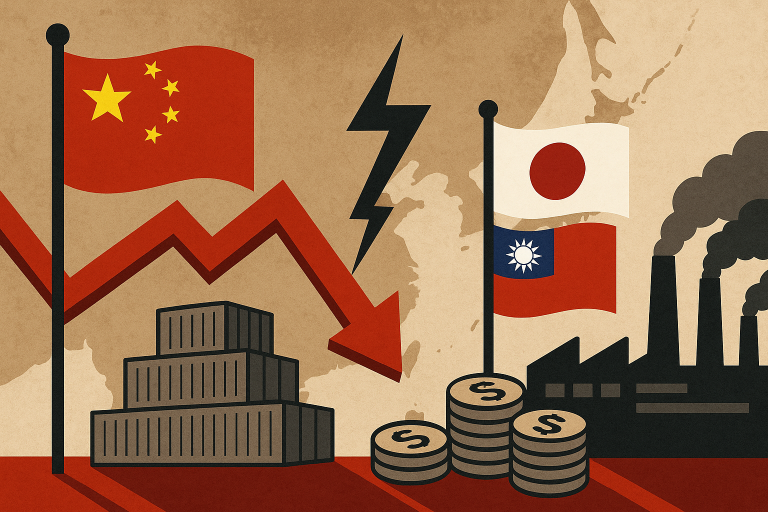
China’s escalating response to Japan’s recent remarks on Taiwan has taken a sharp turn toward economic retaliation, with potential consequences spanning from tourism and trade to military tensions.
As state media hints at sanctions and Beijing activates diplomatic levers, Japan faces its first serious foreign policy test under Prime Minister Sanae Takaichi.
The economic stakes are substantial, with billions in potential losses and risks to key sectors as tensions disrupt a fragile detente between the region’s two biggest economies.
Beijing raises the stakes with retaliation warning
Over the weekend, China’s state-linked social media platform Yuyuantantian, often used to preview official policy, warned that “substantive retaliation” was on the table.
The commentary referenced the possibility of suspending trade, diplomatic, and even military engagement with Japan.
Soon after, China’s military mouthpiece, the People’s Liberation Army Daily, published a piece from a state-affiliated scholar, warning that Japanese involvement in any Taiwan Strait conflict would risk turning the entire country into a battlefield.
The messaging coincides with growing fears that China will again use economic tools to penalise political opposition, as seen in prior disputes.
Beijing’s recent travel advisory targeting Japan, as well as a similar update from Hong Kong authorities, raises the spectre of a tourism freeze similar to the 2012 diplomatic standoff over the Senkaku and Diaoyu islands.
That incident triggered a months-long boycott and caused a double-digit drop in Japan’s exports.
Tourism, trade, and shares immediately affected
The implications for Japan’s economy were felt almost immediately.
Travel-related companies such as Shiseido Co. saw share prices plummet by as much as 11% on Monday.
With Chinese tourists representing about a quarter of annual visitors to Japan, the new travel warnings jeopardise a vital source of revenue.
Takahide Kiuchi, an executive economist at Nomura Research Institute, said in a Bloomberg report that a prolonged freeze in Chinese tourism could slice 2.2 trillion yen ($14.2 billion) off Japan’s economy, which would equal 0.36 percentage points of GDP.
Kiuchi, who also previously served on the Bank of Japan board, linked this estimate to patterns seen in 2012, when Chinese tourist numbers dropped 25% year-on-year.
This reduction, combined with falling exports, dealt a significant blow to Japan’s economy.
Similar sectors are expected to suffer again, with analysts pointing to real estate, retail, leisure, and airline companies as most exposed to disruption.
Diplomatic reset at risk as military signals escalate
The tensions mark a sharp reversal from recent efforts at diplomacy.
Prime Minister Takaichi met Chinese President Xi Jinping just weeks earlier and expressed intent to build personal ties and stabilise relations.
That progress is now under threat, as Takaichi’s recent comments on Taiwan being a survival-threatening situation triggered Beijing’s formal protest.
China’s Ministry of Foreign Affairs summoned Japan’s ambassador under instruction, a phrase typically indicating high-level intervention.
It was followed by military action over the weekend, when four armed Chinese Coast Guard ships passed through disputed waters controlled by Japan before exiting.
The G20 summit in South Africa this weekend may offer an opportunity for dialogue. Japan is sending a senior diplomat to Beijing on Monday in an attempt to de-escalate tensions.
A potential meeting between Takaichi and Chinese Premier Li Qiang could help ease pressure, although no appointment has been scheduled.
Geopolitical backdrop intensifies pressure
China’s warning to Japan comes amid rising global engagement with Taiwan.
A recent visit to Europe by Taiwan’s vice president, the first such event since 2002, angered Beijing.
The island is increasingly asserting diplomatic presence, challenging China’s isolation strategy.
Beijing has also demonstrated a willingness to retaliate economically, as seen during its 2017 dispute with South Korea over the THAAD missile system.
Japan’s proximity to Taiwan, which is only 100 kilometres from Yonaguni Island, and its status as a key trading partner to China, make it uniquely vulnerable.
While Takaichi’s approval ratings remain high, public opinion is split.
A Kyodo News poll showed 48.8% support for Japan exercising collective self-defence in a Taiwan conflict scenario, while 44.2% opposed it.
The current standoff adds further strain to Japan’s economy, which is already battling inflation and a slowdown in growth.
The post China’s retaliation signals economic warpath as Japan-Taiwan tensions rise appeared first on Invezz

